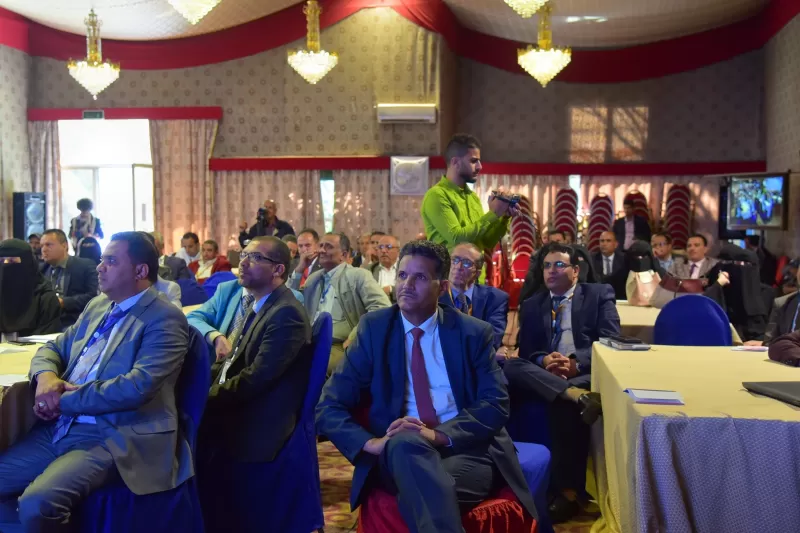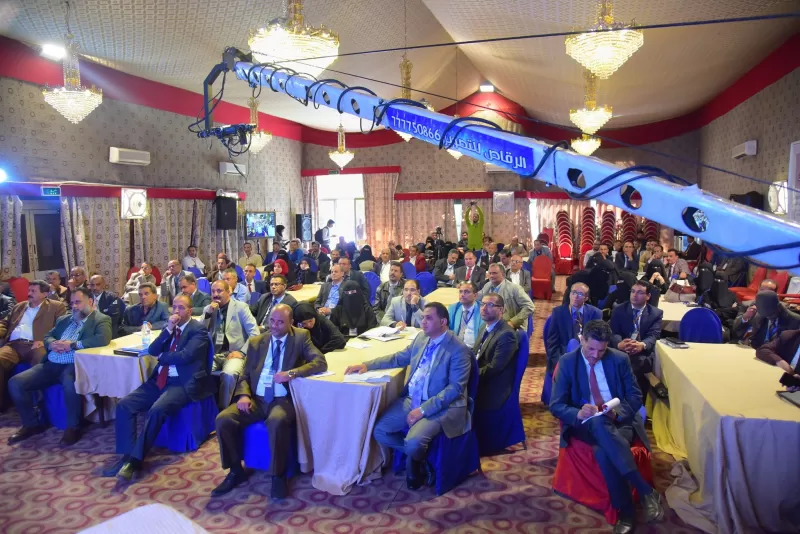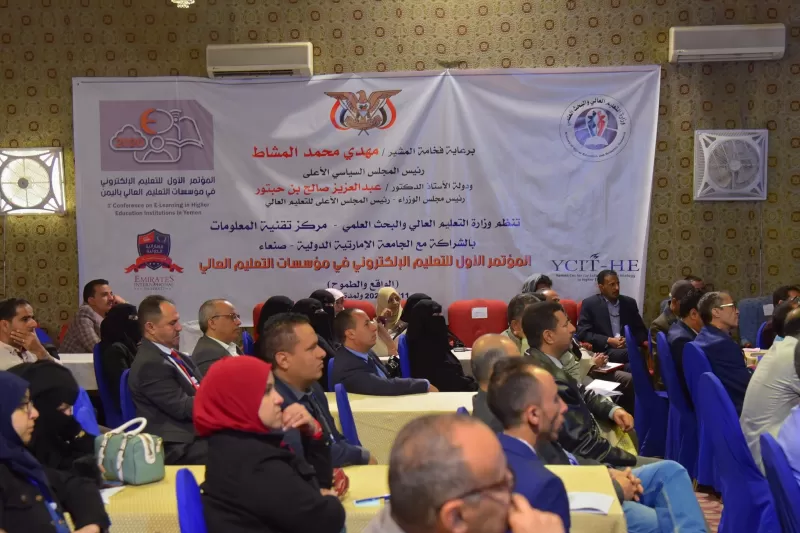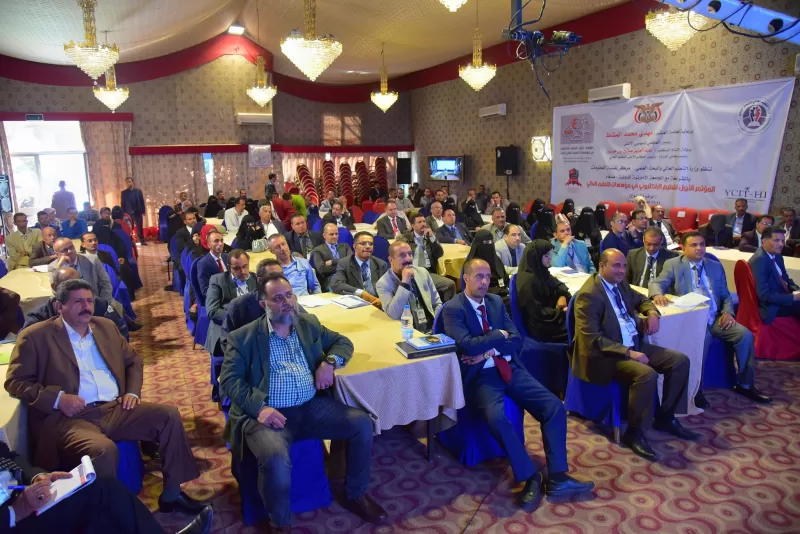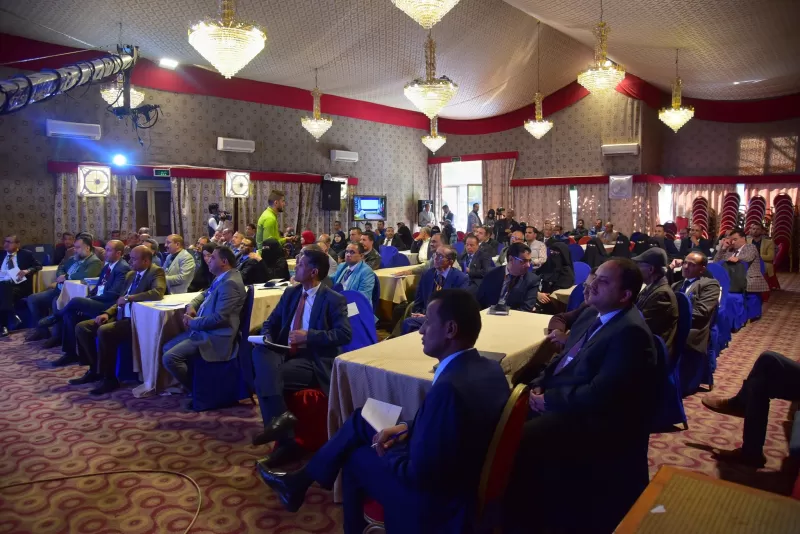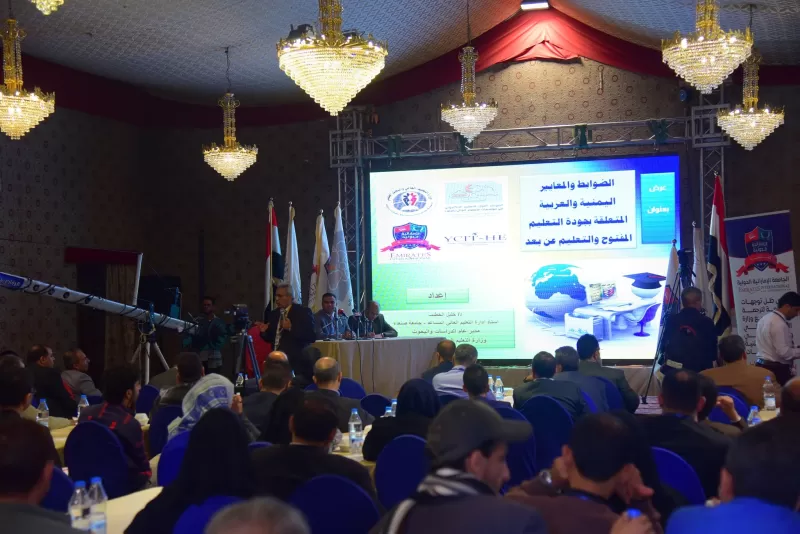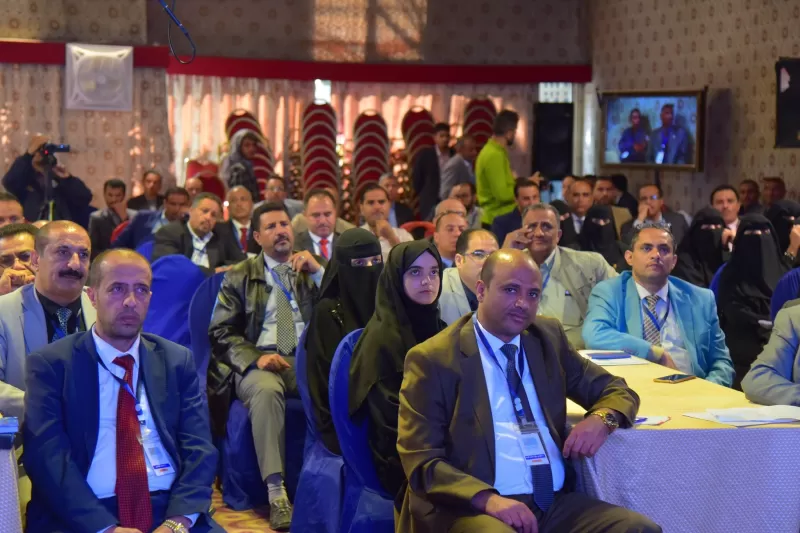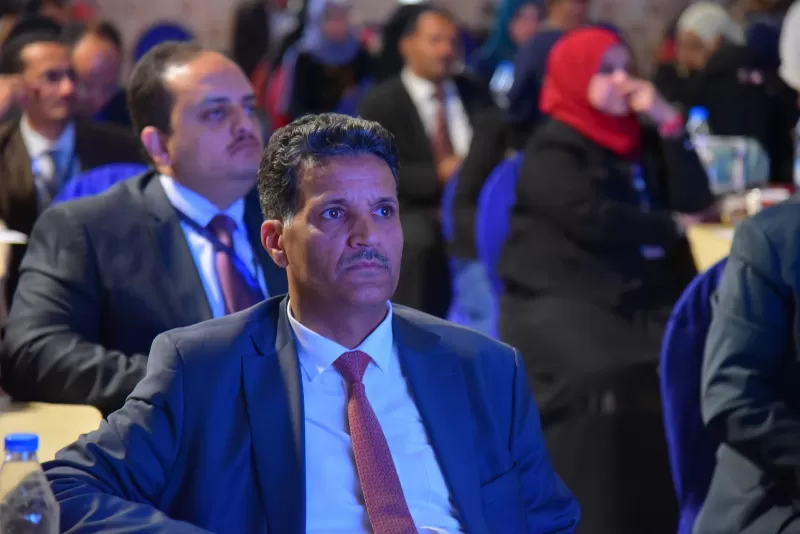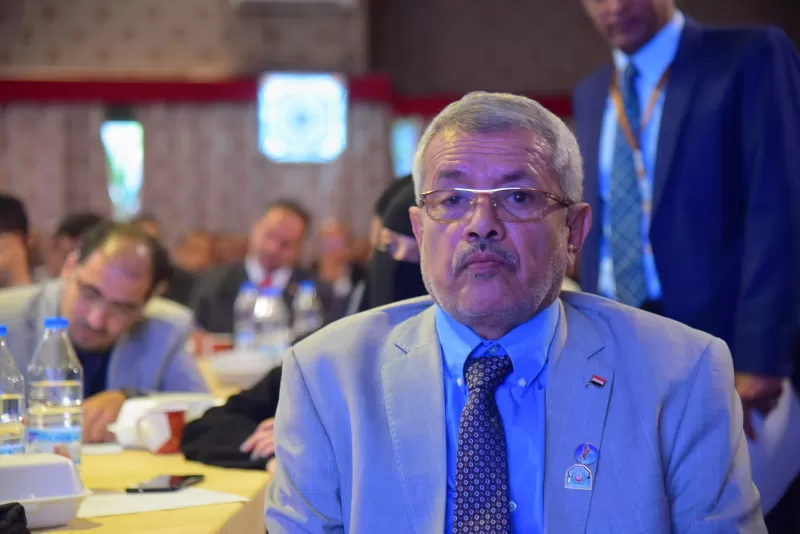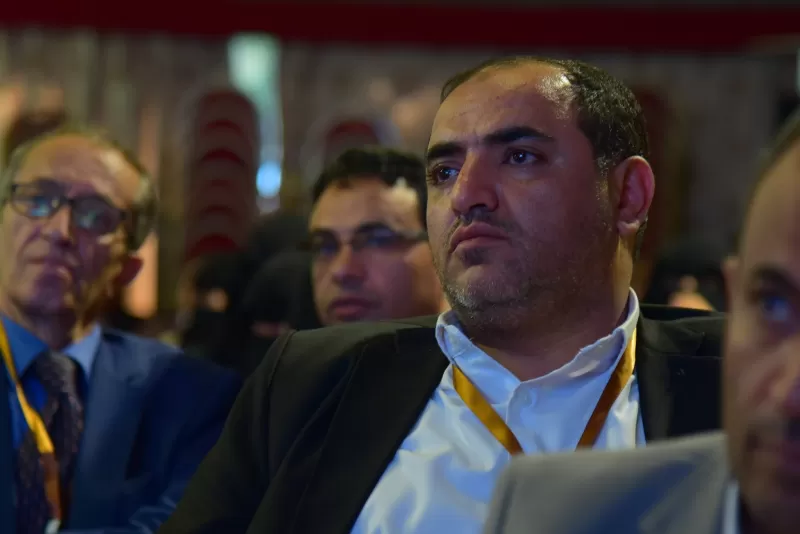Emirates International University
Modernity
Distinguish
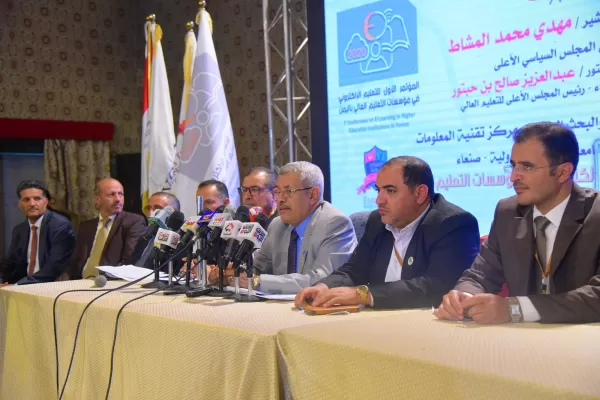
The e-learning conference recommends creating a strategic vision for technology and education
[12/November/2020] Sana'a - Sheba:
The participants in the first scientific conference for e-learning in higher education institutions in Yemen recommended "Reality and Aspirations", to find a national strategic vision for technology, to facilitate the integration of Yemeni society into the global economy. At the conclusion of the two-day conference, which was held in Sana’a, with the participation of a group of opinion leaders, thought and researchers from various Yemeni universities, decision-makers and international experiences from Yemen, Egypt, Oman, Palestine, and Malaysia, the participants stressed the need to prepare public policies and a national strategy for e-learning and e-learning. After and amending the current legislation, laws and standards to accommodate the e-learning developments. The recommendations of the conference, which was organized by the Ministry of Higher Education and Scientific Research represented by the Information Technology Center in partnership with the Emirates International University, called for providing sufficient funding for e-learning and distance education under the clause of an emergency budget to implement its policies and programs in various educational institutions and to update the technical infrastructure to facilitate communication between society and the world. The recommendations also called for exempting technical imports from customs duties, making them available to the public at an appropriate price, and encouraging investment in the communications and information technology sector to improve network performance and speed of connection to it from outside educational institutions. The participants stressed the need to enhance the technical institutional capacity of the Ministry of Higher Education and its affiliated institutions, and for the Academic Accreditation Council to update distance education controls, prepare e-learning standards and related evidence, and submit them to the Ministry to issue decisions obligating higher education institutions to implement them. The recommendations called for the creation of a sector for e-learning and distance education within the organizational structure of the Ministry of Higher Education and defining its tasks and competencies, or supporting the e-learning unit in an information technology center and forming similar units in university institutions. The recommendations stressed the need to spread the culture of e-learning among the academic community and students in university institutions and to work to support the Scientific Publishing Unit at the Information Technology Center to prepare and analyze studies and draw Arab and international experiences and expertise in this field and benefit from them in developing e-learning in Yemen. The participants stressed the importance of providing subscriptions to global libraries for public and private universities, urging universities to develop their electronic platforms and education management systems (LMS), and coordinating with the Ministry of Communications to introduce new technologies to increase the speed of Internet lines, and reduce tariffs and subscriptions for universities, academic staff, and students, and focus on all Patterns of e-learning (full and hybrid), in line with the existing situation, updating the strategy of higher education and scientific research, and adding an e-learning axis. The recommendations also called for the preparation of training packages for academic staff in higher education institutions to prepare the educational content of e-learning, and electronic curricula parallel to the traditional curricula, and the integration of e-learning with traditional education to be in line with modern technology by at least 15 percent. The recommendations stressed the need to strengthen the technical infrastructure of public and private universities, prepare electronic educational platforms, prepare educational content and convert it into electronic content via computers, electronic blackboards, and provide virtual classrooms, studios, and satellite broadcasting devices. The participants unanimously agreed to adhere to the application of the guidelines for teachers and students on how to deal with e-learning and evaluation methods, follow-up learning outcomes, provide feedback to the relevant authorities, continue the e-learning project, and not limit it to the period of the Covid-19 pandemic, by introducing an e-learning clause in the course descriptions. and study programmes. The participants also stressed the importance of creating digital content in the first year of the undergraduate stage to prepare students for e-learning in accordance with the recommendations of the Association of Arab Universities, and to discuss the mechanism of absorbing the education campaign for higher degrees in the field of e-learning and distance education in public and private higher education institutions and providing the necessary support for them to advance this type of education. The participants also recommended the Ministry of Communications to make possible efforts at the present time to modernize the infrastructure of the telecommunications sector in order to facilitate the application of e-learning, reduce the Internet service tariff through telecommunications companies for higher education affiliates, improve its quality and develop its speed to ensure that it reaches all targets in different governorates. The recommendations also called for the development of partnership between the sectors of public, higher and vocational education and the telecommunications sector, which contributes to enhancing the technical capacity of educational institutions, and the work of an internal Internet network for universities that is linked as an external network with the rest of the universities through the national network (service provider). The participants pointed to the need to reserve fiber-optic cables according to the appropriate bandwidth and to organize data traffic between universities through the service provider without the need for the Internet through local DNS, as well as the possibility of allocating IPs for Domains (URL) lines to be added to the main DNS provider of the service (internal), as well as Activating new technologies and expanding the range and speed of the Internet via (LTE/4G) technology available at telecom. The participants also recommended the Ministry of Information to direct visual, audio and print media institutions and through websites and social networks to develop community awareness and spread the culture of e-learning, and to discuss the possibility of establishing a national educational channel specialized in higher education to contribute to the broadcast of some lectures, events and activities related to e-learning and distance education. The participants demanded the cat
The private sector and civil society organizations participate in institutional development and capacity-building of higher education affiliates, contribute to the financing of programs and projects related to e-learning and distance education at the level of the ministry and public and private universities, and support government agencies in developing public awareness and spreading the culture of e-learning. The conference was on its second day, in the presence of the Minister of Higher Education and Scientific Research Hussein Hazeb, his deputy, Dr. Ali Sharaf El-Din, the Executive Director of the Information Technology Center, Dr. Fouad Abdel Razzaq, the President of the UAE University, Dr. Najeeb Al-Kamim, the Ministry’s leaders and heads of public and private universities, and they discussed a number of working papers on the communication system and technology Information and ways to benefit from it in e-learning, the services available through the internet provider Yemen Net, the prospects for e-learning in Yemen, current challenges, possible solutions, and e-learning quality standards. The working papers also dealt with Yemeni and Arab controls and standards related to the quality of open and distance education and virtual laboratories, an education and learning platform for higher education institutions, an opportunity or a challenge, in addition to the challenges of technology and its impact on the educational process and the challenges of e-learning in the third world countries and Yemen and ways to address them. At the conclusion of the conference, the Minister of Higher Education and Scientific Research praised the role of the Information Technology Center and the private sector in supporting the conference and all the efforts made to hold the conference. He stressed that the first scientific conference was able to break the siege barrier and reach the world through direct and live transmission of the opening and working sessions via the Yemen satellite screen, official channels, websites and direct broadcasting techniques, and the sharing of international experiences from several countries in a message that the Yemeni people are steadfast, steadfast and capable of giving and creativity in The darkest conditions. The Minister of Higher Education indicated that the system of reforms in Yemeni universities began in 2017, and achieved a success rate of 70 percent. He touched on the achievements made in the general policy of admission to public and private universities, as well as activating the scientific research sector, linking scientific research networks and registering the titles of theses in it, leading to this conference and transforming its outputs into a tangible reality.

